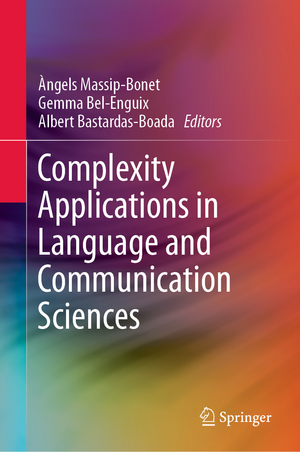Complexity Applications in Language and Communication Sciences
Editat de Àngels Massip-Bonet, Gemma Bel-Enguix, Albert Bastardas-Boadaen Limba Engleză Hardback – 22 ian 2019
Preț: 898.58 lei
Preț vechi: 1095.83 lei
-18% Nou
Puncte Express: 1348
Preț estimativ în valută:
171.100€ • 186.89$ • 144.57£
171.100€ • 186.89$ • 144.57£
Carte tipărită la comandă
Livrare economică 22 aprilie-06 mai
Preluare comenzi: 021 569.72.76
Specificații
ISBN-13: 9783030045968
ISBN-10: 303004596X
Pagini: 265
Ilustrații: XI, 331 p. 63 illus., 38 illus. in color.
Dimensiuni: 155 x 235 mm
Greutate: 0.66 kg
Ediția:1st ed. 2019
Editura: Springer International Publishing
Colecția Springer
Locul publicării:Cham, Switzerland
ISBN-10: 303004596X
Pagini: 265
Ilustrații: XI, 331 p. 63 illus., 38 illus. in color.
Dimensiuni: 155 x 235 mm
Greutate: 0.66 kg
Ediția:1st ed. 2019
Editura: Springer International Publishing
Colecția Springer
Locul publicării:Cham, Switzerland
Cuprins
Introduction; Àngels Massip, Gemma Bel-Enguix, Albert Bastardas-Boada.- Part I: Interdisciplinary approaches for linguistics and biology.- Science as a Self-organizing Cognitive System. Coherence and Flexibility of Scientific Explanatory Patterns; Robert Hristovski, Natàlia Balagué, Pablo Vázquez.- The Paradigm of Complexity in Sociology: Epistemological and Methodological Implications; Alvaro Malaina.- How and why to Model the Complexity of Thought Systems; Leonardo Rodríguez Zoya.- Part II: Language change.- Linguistic Variation and Change: Approach from the Perspective of Complex Adaptive Systems; Àngels Massip-Bonet.- Some Theoretical Prerequisites for the Integrated Study of Linguistic “Macrochange”; Enrique Bernárdez.- The Impact of Social Reputation in Language Evolution; Gemma Bel-Enguix.- Part III: Sociolinguistics.- Restricted’ and ‘general’ complexity perspectives on social bilingualisation and language shift processes; Albert Bastardas-Boada.- Patterns of linguistic diffusion in space and time: the case of Mazatec; Léo Léonard, Marco Patriarca, Els Heinsalu, Kiran Sharma, Anirban Chakraborti.- Common knowledge in conversation of bilinguals and the ecology of pressures. The complex processes of using language and learning to coordinate actions with other speakers; Roland Terborg, Virna Velázquez.- Part IV: Discourse analysis.- Discourse Analysis: Constructivist Perspective and Transdisciplinarity; Esperanza Morales López.- A complex approach to prosodic discourse variation; Raquel García Riverón and Fidel Alejandro Marrero Montero.- Amazing Grace: An Analysis of Barack Obama’s Raciolinguistic Performances; Sami Alim.- Part V: Syntax, Semantics and Cognition.- How to convert a very complex process into something amazingly simple? The case of lexical access; Michael Zock.- The emergence of hubs in complex syntactic networks and the DP Hypothesis: the relevance of a linguistic analysis; Lluís Barceló-Coblijn, Maia Duguine, Aritz Irurtzun.- The World Color Survey: data analysis and simulations; Peter Lewinski, Michal Lukasik, Konrad Kurdej, Filip Leonarski, Natalia Bielczyk, Franciszek Rakowski, Joanna Rączaszek-Leonardi, Dariusz Plewczynski.- Cognitive Meaning: Review of the Concepts of Imagination, Image Schema and Mental Image and Consequences on the Conceptualization of Emotions; Maria Antònia Font.
Notă biografică
Àngels Massip-Bonet is full professor in the Department of Catalan Philology and General Linguistics at the University of Barcelona. She has promoted together with Dr. Bastardas-Boada the creation of a transdisciplinary research group (Sociocomplexitat) at the University of Barcelona, currently part of the University of Barcelona Institute of Complex Systems (UBICS). She has published several books and articles dealing with topics related to linguistic variation, history of language, dialectology and sociolinguistics, in the frame of complexity. She is researcher in Catalan Dialectology (main researcher of the project –promoted together with Dr. Veny- "Diatopia and linguistic change. Scripta and dialectal variation" FFI2016-80482-P of the Spanish Ministry of Economy, Industry and Competitiveness (Scripta).
Textul de pe ultima copertă
This book offers insights on the study of natural language as a complex adaptive system. It discusses a new way to tackle the problem of language modeling, and provides clues on how the close relation between natural language and some biological structures can be very fruitful for science. The book examines the theoretical framework and then applies its main principles to various areas of linguistics. It discusses applications in language contact, language change, diachronic linguistics, and the potential enhancement of classical approaches to historical linguistics by means of new methodologies used in physics, biology, and agent systems theory. It shows how studying language evolution and change using computational simulations enables to integrate social structures in the evolution of language, and how this can give rise to a new way to approach sociolinguistics. Finally, it explores applications for discourse analysis, semantics and cognition.
Caracteristici
The first book to provide contributions to linguistics from the perspective of complex systems Offers insights on modeling in natural language, including applications in language change, language contact, sociolinguistics, discourse analysis, semantics and cognition Investigates the use of methodologies from physics, biology and agent systems theory in the field of applied linguistics
